If My Child Has a Speech Delay Do They Have Autism?
In This Article
- Autism vs. Speech Delay
- Speech Blubs App for Kids with Speech Delay
- Autism Signs and Symptoms
- Speech Delay Signs and Symptoms
Any professional who examines your child will know the difference between autism and speech delay, and won’t just give a diagnosis to give a diagnosis. Secondly, if you are concerned about a speech delay or autism spectrum disorder, you should take your child to see a speech-language pathologist (SLP).
SLPs cannot diagnose autism; that is done by a developmental pediatrician. Learn more about how autism is diagnosed! SLPs can, however, tell you that they are seeing signs of autism in your child.
https://www.youtube.com/watch?v=ifOeX3K1Jxk
Watch this video to understand the difference between speech delay and autism.
From my professional experience and from what studies have shown, it is very important that if you feel like your child is showing signs/symptoms from either list, then it’s important to see the appropriate medical professionals to get an accurate diagnosis. I will, for the purpose of this blog, go through both diagnoses and their signs/symptoms.
Autism vs. Speech Delay
Speech Blubs App for Kids with Speech Delay
Speech Blubs is a language therapy app with more than 1,500 activities, face filters, voice-activated activities, and educational bonus videos.
The more you practice, the more it carries over into real-life situations! Try the Speech Blubs app for fun and engaging therapy sessions with your little one.
Autism Signs and Symptoms
There are many signs and symptoms that could indicate a person has autism spectrum disorder (ASD). Not all adults or children with ASD will have every symptom, and some adults and children without ASD may display some of the same behaviors and symptoms. Check the following to learn the signs:
- Delayed speech and communication skills
- Avoids eye contact
- Relies on rules and routines (rigidity)
- Is upset by relatively minor changes
- Reacts unexpectedly to sounds, tastes, sights, touch, and smells
- Has difficulty understanding other people’s emotions
- Focuses on or becomes obsessed with a narrow range of interests or objects
- Engages in repetitive behavior such as flapping hands or rocking
- Doesn’t respond to their names by 12 months
- Doesn’t point at distant objects by 14 months
Speech Delay Signs and Symptoms
A speech and language delay is when a child isn’t developing speech and language at an expected rate. It is a common developmental problem that affects as many as 10% of preschool children. Your child may have a speech delay if he or she isn’t able to do these things:
- Says simple words (such as “mama”) either clearly or unclearly by 12 to 15 months of age,
- Isn’t using gestures, such as pointing or waving bye-bye by 12 months of age,
- Prefers gestures over vocalizations to communicate,
- Has trouble imitating sounds by 18 months of age,
- Understands simple words (such as “no” or “stop”) by 18 months of age,
- Has trouble understanding simple verbal requests.
- Can only imitate speech or actions and doesn't produce words or phrases spontaneously by 2 years of age,
- Says only some sounds or words repeatedly and can’t use oral language to communicate more than their immediate needs by 2 years of age,
- Can't follow simple directions by 2 years of age,
- Has an unusual tone of voice (such as raspy or nasal sounding) by 2 years of age,
- Talks in short sentences by 3 years of age,
- Can tell a simple story at 4 to 5 years of age.
Remember, early intervention with both conditions will result in your child having a better chance at having speech that meets his/her developmental milestones. Children with autism especially need the help of a professional so their language skills allow them to communicate more effectively with more neurotypical kids.
 By Stacie Bennett
By Stacie Bennett